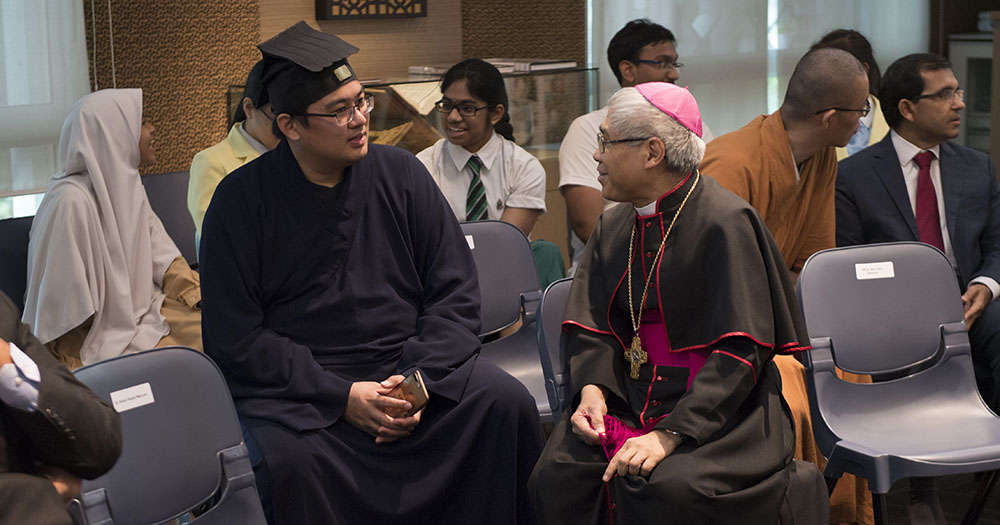(UPDATE on Tuesday, Sep. 3: A previous version of this article incorrectly spelled the name of the Hindu Advisory Board. This has been amended accordingly. We are sorry for the error.)
All religious groups will soon be required to disclose foreign donations of S$10,000 or more, as well as their foreign affiliations, if the Maintenance of Religious Harmony Act (MRHA) is amended.
Their leadership members, such as the President, Secretary and Treasurer, must consist of only Singaporean Citizens or Permanent Residents (PR).
The Minister for Home Affairs will be able to issue immediate Restraining Orders (RO) against religious organisations if necessary, intended to curb the influence and activities of foreign entities that may act through the organisation.
Safeguarding against foreign influence in Singapore
The requirements and measures from the MRHA were part of introducing safeguards against foreign influence in religious affairs in Singapore.
A press release by the Ministry of Home Affairs (MHA) elaborated that Singapore was vulnerable to foreign actors exploiting religious fault lines in local society.
Additionally, such entities could impose values that are inappropriate for Singapore, resulting in the undermining of religious harmony through religious organisations.
As such, the measures are aimed at addressing the issue of how they can exert influence and control on religious organisations through donations, affiliations, or by holding leadership positions.
Foreign donations
Religious organisations will be required to disclose the receipt of one-time foreign donations of $10,000 or more.
When asked about the threshold, a spokesperson for MHA told Mothership that the figure of S$10,000 was set to achieve a balance between safeguarding against foreign influence, and not making the requirement too onerous on religious organisations.
Exemptions to the disclosure of foreign donations will apply to the following:
- Those made by Singapore Citizens and PRs.
- Foreigners in Singapore on long-term passes (e.g. Employment Pass, Long Term Visit
Pass, Student Pass).
- Anonymous donations (e.g. via donation boxes placed at the religious site).
- Donations-in-kind.
- Zakat and Fitrah.
Foreign Affiliations
Religious organisations will also be required to disclose affiliations to foreign individuals or organisations, should these entities hold a position of power or control over them.
This measure however, is purely disclosure.
The amendment will not provide additional powers for the government to ask the local religious organisation to dissociate from their foreign affiliations.
This is because there are several major religions in Singapore that take guidance on key tenets of their faiths from foreign entities (e.g. the Catholic Church in Singapore and the Vatican).
Leadership
The President, Secretary and Treasurer (or their equivalent roles) of a religious organisation must either be a Singapore Citizen or a PR, and the majority of the executive committee must be Singapore Citizens.
Under an RO, the Minister can impose a requirement for the entire Exco to be Singapore Citizens, or to impose prohibitions on the eligibility of specific people to hold office.
Exemptions will be granted by MHA on a case-by-case basis to certain religious organisations. These can include religious organisations that were historically established as cross-border institutions.
An exemption may also be made for foreign leadership that has been assessed as not holding views or intentions that will adversely impact religious harmony in Singapore.
Several organisations consulted
MHA said that it had consulted the following organisations:
- Roman Catholic Archdiocese of Singapore
- Islamic Religious Council of Singapore
- National Council of Churches Singapore
- Singapore Buddhist Federation
- Taoist Federation
- Sikh Advisory Board
- Hindu Endowments Board
- Hindu Advisory Board
It added that it had consulted organisations that had overseas HQs, or foreigners in their leadership.
Such organisations consulted included:
- Southeast Asia Union Mission of Seventh-Day Adventists.
- The Church of Jesus Christ of Latter-Day Saints.
- Wat Ananda Metyarama.
- Korean Church Council in Singapore.
How an RO against a religious organisation will be issued
The process of issuing an RO against a religious organisation will be the same as that of an RO issued against an individual.
The Minister issues a Restraining Order against the religious organisation, which takes effect immediately.
The religious organisation then has 14 days to make representations to the Presidential Council for Religious Harmony (PCRH).
Subsequently, the PCRH will make a recommendation to the President within 30 days from the end of the written representation period.
Afterwards, the President is to confirm, vary, or cancel the Order within 30 days from receiving PCRH’s recommendations.
In the event an RO is issued against a religious organisation, this can include:
- Restricting or prohibiting the local religious organisation from receiving donations from either specific or all foreign donors.
- Requiring the entire governing body to be Singaporean citizens.
- Suspending or removing specific foreigners from the governing body of the religious organisation.
- They may also be made to return the donation.
Top photo by Arthur Edwards-Pool via Getty Images
If you like what you read, follow us on Facebook, Instagram, Twitter and Telegram to get the latest updates.
